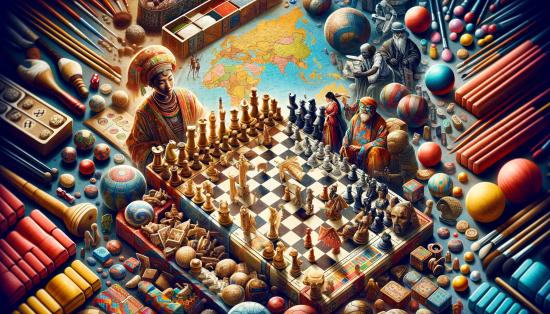
The Cultural Evolution of Board Games: A Global Perspective
Delve into the fascinating world of board games, exploring their cultural significance, evolution, and impact on society across different cultures.
Welcome to the enchanting realm of board games! In this introductory chapter, we embark on a journey through the diverse and captivating world of board gaming. Board games have an extensive history and have played pivotal roles in cultures worldwide. They are more than just entertainment; they are windows into the human experience, offering insights into strategy, society, and the human mind. As we delve deeper into this world, we'll uncover the historical origins of board games, explore their cultural significance in various societies, and examine how game mechanics and design have evolved over time. Get ready to roll the dice and move your pieces across the board as we unlock the secrets and stories behind these timeless games.
To truly appreciate the world of board games, we must embark on a journey back in time to explore their historical origins. Board games have an extensive and rich history that dates back thousands of years. The earliest evidence of board games can be traced to ancient civilizations such as Mesopotamia and Egypt. These ancient games, like the Royal Game of Ur and Senet, provide a fascinating glimpse into the past, offering insights into the cultures, beliefs, and leisure activities of their time. As we delve deeper into the historical tapestry of board games, we'll uncover their evolution from simple pastimes to complex strategic challenges, all while tracing their path through different civilizations and regions. Join us on this historical voyage as we uncover the origins of the games that continue to captivate and unite people across the globe.
Board games have transcended mere entertainment to become a reflection of cultural values, beliefs, and societal norms in various societies around the world. Each culture has its unique set of board games, and these games often serve as more than just pastimes; they are windows into the essence of a community. For example, in China, the ancient game of Go not only tests strategic thinking but also embodies the importance of balance and harmony. In India, games like Pachisi and Chaturanga have roots in military strategy and illustrate the country's historical prowess. We'll explore these and many more examples, unveiling how board games have been instruments for storytelling, education, and social bonding across diverse cultures. Join us on this global journey to discover the profound cultural significance embedded within the squares and pieces of board games.
As board games have journeyed through time and across continents, their mechanics and designs have undergone remarkable transformations. From the simple yet strategic gameplay of ancient games like Senet to the intricate rules and components of modern board games like Settlers of Catan, the evolution of game mechanics and design is a testament to human creativity and innovation. This evolution reflects not only advancements in technology and materials but also shifts in cultural preferences and the desire for more immersive and engaging gaming experiences. In this section, we'll delve into the fascinating history of how game mechanics and design have evolved, exploring the pivotal moments, influential designers, and the impact of changing tastes on the board game landscape.
Board games have often served as more than just entertainment; they are mirrors that reflect the social and political trends of their times. Throughout history, these games have been used to convey cultural values, ideologies, and even propaganda. For example, during the 19th century, games like 'The Mansion of Happiness' and 'The Checkered Game of Life' in the United States reflected prevailing moral and societal norms. In contrast, games like 'Class Struggle' in the 1970s provided a platform for political commentary and critique. This section explores how board games, through their themes, mechanics, and narratives, offer insights into the ever-evolving social and political landscapes they emerge from, making them not just pastimes but also tools for understanding the human condition.
Board games have a multifaceted role in education and human development. They offer a unique platform for learning, fostering cognitive skills, strategic thinking, and problem-solving abilities. Whether in classrooms, homes, or community centers, board games have been used as educational tools to teach subjects ranging from mathematics to history. Moreover, they encourage social interaction, communication, and teamwork, helping individuals develop crucial life skills. In this section, we delve into how board games serve as effective instruments for education and personal growth, exploring their impact on various aspects of human development.
The influence of technology on modern board games has been transformative. In an era of smartphones, tablets, and digital platforms, traditional board games have adapted and evolved. Digital versions of classic board games are now readily available, allowing players to enjoy their favorite titles virtually and connect with opponents worldwide. Additionally, technology has enabled the creation of hybrid board games that incorporate digital elements, enhancing gameplay with interactive features and immersive experiences. In this section, we explore how technology has shaped the landscape of board gaming, offering both new opportunities and challenges for enthusiasts and designers alike.
In contemporary pop culture, board games have experienced a renaissance, capturing the hearts and minds of a diverse audience. No longer confined to niche hobbyists, board games have entered the mainstream, thanks to their accessibility and engaging gameplay. From popular board game cafes to televised board game competitions, these tabletop experiences have become a staple of social gatherings and entertainment. In this section, we delve into the role of board games in contemporary pop culture, exploring their resurgence, the communities that have formed around them, and their influence on TV, movies, and other forms of media.
As we look to the future of board gaming, several exciting trends and predictions emerge. The industry is expected to continue its growth, with more innovative and diverse games hitting the market. Collaborative and cooperative board games are gaining popularity, emphasizing teamwork and shared experiences. Furthermore, we anticipate the integration of augmented reality (AR) and virtual reality (VR) technologies to enhance gameplay, creating immersive and dynamic board game experiences. Sustainability is also a focal point, with board game designers and manufacturers exploring eco-friendly materials and practices. Board games are poised to become even more inclusive and accessible, ensuring that this beloved pastime continues to bring people together for years to come.
In conclusion, the universal appeal of board games transcends time, culture, and technology. From their ancient origins to their contemporary resurgence, board games have served as more than just a source of entertainment; they are windows into the human experience. These games reflect our history, values, and aspirations, allowing us to connect with one another on a profound level. As we embrace the future of board gaming with evolving trends and innovations, it's clear that these beloved pastimes will continue to foster connection, creativity, and shared experiences among people of all ages and backgrounds. The cultural evolution of board games is a testament to their enduring significance in our ever-changing world.
Related posts



